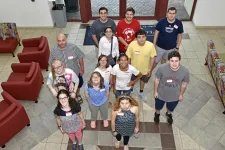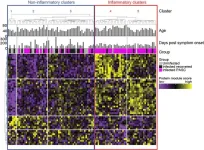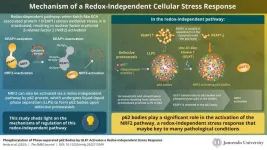(Press-News.org) Employees who frequently interact with artificial intelligence systems are more likely to experience loneliness that can lead to insomnia and increased after-work drinking, according to research published by the American Psychological Association.
Researchers conducted four experiments in the U.S., Taiwan, Indonesia and Malaysia. Findings were consistent across cultures. The research was published online in the Journal of Applied Psychology.
In a prior career, lead researcher Pok Man Tang, PhD, worked in an investment bank where he used AI systems, which led to his interest in researching the timely issue.
“The rapid advancement in AI systems is sparking a new industrial revolution that is reshaping the workplace with many benefits but also some uncharted dangers, including potentially damaging mental and physical impacts for employees,” said Tang, an assistant professor of management at the University of Georgia. “Humans are social animals, and isolating work with AI systems may have damaging spillover effects into employees’ personal lives.”
At the same time, working with AI systems may have some benefits. The researchers found that employees who frequently used AI systems were more likely to offer help to fellow employees, but that response may have been triggered by their loneliness and need for social contact.
Furthermore, the studies found that participants with higher levels of attachment anxiety – the tendency to feel insecure and worried about social connections – responded more strongly to working on AI systems with both positive reactions, such as helping others, and negative ones, such as loneliness and insomnia.
In one experiment, 166 engineers at a Taiwanese biomedical company who worked with AI systems were surveyed over three weeks about their feelings of loneliness, attachment anxiety and sense of belonging. Coworkers rated individual participants on their helpful behaviors, and family members reported on participants’ insomnia and after-work alcohol consumption. Employees who interacted more frequently with AI systems were more likely to experience loneliness, insomnia and increased after-work alcohol consumption, but also showed some helping behaviors toward fellow employees.
In another experiment with 126 real estate consultants in an Indonesian property management company, half were instructed not to use AI systems for three consecutive days while the other half were told to work with AI systems as much as possible. The findings for the latter group were similar to the previous experiment, except there was no association between the frequency of AI use and after-work alcohol consumption.
There were similar findings from an online experiment with 214 full-time working adults in the U.S. and another with 294 employees at a Malaysian tech company.
The research findings are correlational and don't prove that work with AI systems causes loneliness or the other responses, just that there is an association among them.
Tang said that moving forward, developers of AI technology should consider equipping AI systems with social features, such as a human voice, to emulate human-like interactions. Employers also could limit the frequency of work with AI systems and offer opportunities for employees to socialize.
Team decision-making and other tasks where social connections are important could be done by people, while AI systems could focus more on tedious and repetitive tasks, Tang added.
“Mindfulness programs and other positive interventions also might help relieve loneliness,” Tang said. “AI will keep expanding so we need to act now to lessen the potentially damaging effects for people who work with these systems.”
ARTICLE: “No Person Is an Island: Unpacking the Work and After-work Consequences of Interacting with Artificial Intelligence,” Pok Man Tang, PhD, University of Georgia; Joel Koopman, PhD, Texas A&M University; Ke Michael Mai, PhD, and David De Cremer, PhD, National University of Singapore; Jack H. Zhang, PhD, Nanyang Business School; Philipp Reynders, PhD, Cardiff University; Chin Tung Stewart Ng, MSc, and I-Heng Chen, PhD, National Sun Yat-sen University; Journal of Applied Psychology, published online June 12, 2023.
CONTACT: Pok Man Tang, PhD, may be contacted at pokmantang620@gmail.com
END
Loneliness, insomnia linked to work with AI systems
After-work drinking also associated with AI work, study finds
2023-06-12
ELSE PRESS RELEASES FROM THIS DATE:
FAU awarded $1.5 million teaching grant for adults with intellectual disabilities
2023-06-12
Florida Atlantic University’s College of Education has received a three-year $1.5 million grant through the Florida Center for Students with Unique Abilities (FCSUA) for the FAU Academy for Community Inclusion. The funds will help sustain the academy, an approved Florida Postsecondary Comprehensive Transition Program (FPCTP) that serves the community through continuing employment and independent living skills opportunities for adults with intellectual disabilities.
Unemployment and under-employment for people with intellectual disabilities far exceed the norm – less than 10 percent of adults with intellectual ...
Many long COVID patients suffer from persistent inflammation, study finds
2023-06-12
An overactive inflammatory response could be at the root of many long COVID cases, according to a new study from the Allen Institute and Fred Hutchinson Cancer Center.
Looking at proteins circulating in the blood, the scientists found a set of molecules associated with inflammation that were present only in a subset of patients with long COVID and were not seen in those who recovered from their disease. The researchers published an article describing their findings in the journal Nature Communications today.
Out of 55 patients with long ...
All-electric rideshare fleet could reduce carbon emissions, increase traffic issues
2023-06-12
Two major ridesharing companies have promised all-electric fleets by 2030 in an effort to reduce their carbon footprint. To understand additional impacts of this transition, researchers reporting in ACS’ Environmental Science & Technology conducted life-cycle comparisons of battery-powered electric vehicle fleets to a gas-powered one, using real-world rideshare data. They found up to a 45% reduction in greenhouse gas emissions from full electrification; however, traffic problems and air pollution could increase.
Ridesharing apps are an increasingly popular way to travel around urban areas, ...
Taking biofabrication to the next level: innovations in volumetric bioprinting
2023-06-12
Taking biofabrication to the next level: innovations in volumetric bioprinting
UMC Utrecht researchers propose solutions for bioprinting living tissue
Bioprinting is the printing of living cells and tissues. It's a promising technique that hopefully, one day, can solve the organ donor shortage by growing organs from patients' own cells. However, printing living tissues and cells is extremely complicated, and many hurdles need to be overcome to be able to get there. In this article, three recent innovations ...
Insights into redox-independent cellular stress response
2023-06-12
Cellular stress, or oxidative stress, occurs when there is a buildup of reactive oxygen species (ROS), which interferes with cellular mechanisms and can even cause damage to proteins, lipids, and DNA. Owing to their destructive nature, all cells have robust mechanisms in place to remove ROS and reduce oxidative stress. One such mechanism is the nuclear factor erythroid 2-related factor 2 (NRF2)-mediated stress response, where NRF2 is a master transcription factor that aids in reducing oxidative stress.
Much is known about the redox-dependent activation of NRF2 and its subsequent role in stress response. In this pathway, ...
Chronic exposure to lead, cadmium and arsenic increases risk of cardiovascular disease
2023-06-12
Statement Highlights:
Around the world, most people are regularly exposed to low or moderate levels of lead, cadmium and arsenic in the environment, increasing risk of coronary artery disease, stroke and peripheral artery disease, according to a new American Heart Association statement.
These metals, considered contaminant metals, have no function in the human body. They are found in groundwater, water pipes, paint, tobacco products, fertilizer, plastic, electronics, gasoline, batteries, some foods and other commonly used items.
Lead, ...
Which women should receive more than mammograms to screen for breast cancer?
2023-06-12
Study’s findings point to the importance of considering other risk factors beyond breast density.
Dense breast tissue, which contains a higher proportion of fibrous tissue than fat, is a risk factor for breast cancer and also makes it more difficult to identify cancer on a mammogram. Many states have enacted laws that require women with dense breasts to be notified after a mammogram, so that they can choose to undergo supplemental ultrasound screening to improve cancer detection. A recent study published ...
Twenty species of sea lettuce found along the Baltic and Scandinavian coasts
2023-06-12
The number of species of the green alga sea lettuce in the Baltic Sea region and Skagerak and is much larger than what was previously known. Researchers at the University of Gothenburg have surveyed 10,000 kilometres of coast and found twenty species of sea lettuce.
Green macroalgae of the genus Ulva, also known as sea lettuce, are almost ubiquitous in the wider Baltic Sea region and and can be found from the Atlantic waters all the way up to the Bay of Bothnia in the Baltic Sea. Sea lettuce reproduce easily and grow ...
Cancer diagnoses dropped sharply in Alberta during COVID-19 response
2023-06-12
Pandemic restrictions corresponded with a significant drop in diagnoses of breast, colorectal and prostate cancers as well as melanoma, according to a new Alberta study published in CMAJ (Canadian Medical Association Journal) https://www.cmaj.ca/lookup/doi/10.1503/cmaj.221512.
"The sweeping and unprecedented measures enacted at the beginning of the COVID-19 pandemic in Alberta had an inevitable impact on cancer care," writes Dr. Darren Brenner, an epidemiologist in Calgary, Alberta, and associate professor at the University of Calgary's Cumming School of Medicine, with coauthors. "Even though treatment and urgent surgeries for cancers were prioritized ...
Canada’s carbon pricing poses a $256 billion financial risk for borrowers and banks
2023-06-12
By putting a price on the cost of carbon, the Government of Canada aims to curtail greenhouse gas (GHG) emissions, but it comes with an increased risk for financial lenders and borrowers with high carbon emissions.
In a first-of-its-kind study, University of Waterloo researchers analyzed the effects of Canada’s carbon price regime on the economy. The results indicate that as carbon costs rise, high-emitting carbon industries such as mining and energy are at the greatest risk of default, with total assets of $256 billion at risk of being lost and almost a quarter ...
LAST 30 PRESS RELEASES:
Novel camel antimicrobial peptides show promise against drug-resistant bacteria
Scientists discover why we know when to stop scratching an itch
A hidden reason inner ear cells die – and what it means for preventing hearing loss
Researchers discover how tuberculosis bacteria use a “stealth” mechanism to evade the immune system
New microscopy technique lets scientists see cells in unprecedented detail and color
Sometimes less is more: Scientists rethink how to pack medicine into tiny delivery capsules
Scientists build low-cost microscope to study living cells in zero gravity
The Biophysical Journal names Denis V. Titov the 2025 Paper of the Year-Early Career Investigator awardee
Scientists show how your body senses cold—and why menthol feels cool
Scientists deliver new molecule for getting DNA into cells
Study reveals insights about brain regions linked to OCD, informing potential treatments
Does ocean saltiness influence El Niño?
2026 Young Investigators: ONR celebrates new talent tackling warfighter challenges
Genetics help explain who gets the ‘telltale tingle’ from music, art and literature
Many Americans misunderstand medical aid in dying laws
Researchers publish landmark infectious disease study in ‘Science’
New NSF award supports innovative role-playing game approach to strengthening research security in academia
Kumar named to ACMA Emerging Leaders Program for 2026
AI language models could transform aquatic environmental risk assessment
New isotope tools reveal hidden pathways reshaping the global nitrogen cycle
Study reveals how antibiotic structure controls removal from water using biochar
Why chronic pain lasts longer in women: Immune cells offer clues
Toxic exposure creates epigenetic disease risk over 20 generations
More time spent on social media linked to steroid use intentions among boys and men
New study suggests a “kick it while it’s down” approach to cancer treatment could improve cure rates
Milken Institute, Ann Theodore Foundation launch new grant to support clinical trial for potential sarcoidosis treatment
New strategies boost effectiveness of CAR-NK therapy against cancer
Study: Adolescent cannabis use linked to doubling risk of psychotic and bipolar disorders
Invisible harms: drug-related deaths spike after hurricanes and tropical storms
Adolescent cannabis use and risk of psychotic, bipolar, depressive, and anxiety disorders
[Press-News.org] Loneliness, insomnia linked to work with AI systemsAfter-work drinking also associated with AI work, study finds




